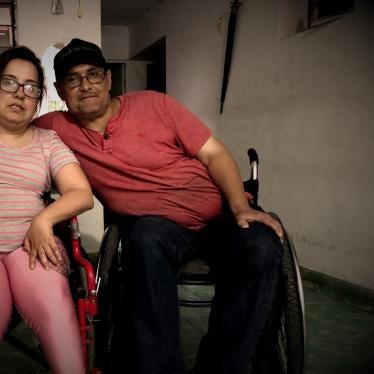Mexico City ’s Congress is currently discussing a new bill on the system of care, creating the practical framework for implementing the right to care under the city’s 2017 constitution.
The government is right to consider how to meet the basic needs of people who require support to perform daily activities. But when it comes to caring for people with disabilities and older people, it places too much emphasis on care by their family members. Instead Congress should focus on providing more support services that would facilitate people’s independence and autonomy.
The bill emerges from a recognition of the undue burden many women face in their traditional role as primary caregiver, most often of children, older people, and people with disabilities or chronic illnesses.
The bill has two main objectives. One is to provide a series of benefits for parents who are raising their children. Many of these benefits are absolutely essential for the family members who care for children, such as flexibility in working hours and the possibility of working remotely.
The policy also promotes care of adults who are in so-called “situations of dependency,” due to a health condition, disability, or age.
When Mexico ratified the UN Convention on the Rights of Persons with Disabilities in 2007, it committed to ensuring the rights of adults with disabilities to live independently, to participate in the community, cultural life, family life, and work on an equal basis with others, and to make decisions for oneself, among others.
Mexico’s polices, whether at a national, state or city level, should respect and where appropriate help fulfil these human rights obligations, including the right of people with disabilities to choose what types of support they want and who should provide it.
Rather than looking to develop these support services, the draft bill places responsibility for support to adults with disabilities and older people on their families, whether this is what the individual and the family prefers or not. In this system, the government hands over to families the bulk of the responsibility to provide social services, rather than providing those social services itself.
Much of Mexico´s legislation and many policies are built on the idea of the family as the exclusive source of support and care. Most Mexican states have laws requiring families to provide fully for adult family members with disabilities. In some states, failing to support a family member with a disability is considered a crime.
But Mexico City should not miss this opportunity to enable people with disabilities and older people to select the person who provides the support and the services that best meet their needs.
If adults with disabilities and older people and their families choose to organize support within the family, then that choice should be respected. But family care should not be a replacement for the government’s obligations to provide community-based services to ensure the personal autonomy and rights of adults with disabilities and older people.
The City Council should ensure that people who need support have access to professional personal assistants who can help with self-care, meals, household tasks, and the like. Some countries, including the UK and France are providing funds to people who need these services to hire their own personal assistants. This can be effective in to ensure the right of people with disabilities and older people to have control over their lives.
The creation of a system in Mexico City to provide care was grounded on a desire to improve the rights of women, who are often the only support available for people with disabilities and older people This is important. But with this bill, the government also has an opportunity also to improve the rights of adults with disabilities and older people to live independently, work, have a family, and participate in community life, on an equal basis with others. The focus should be on furthering autonomy, not entrenching dependence.









